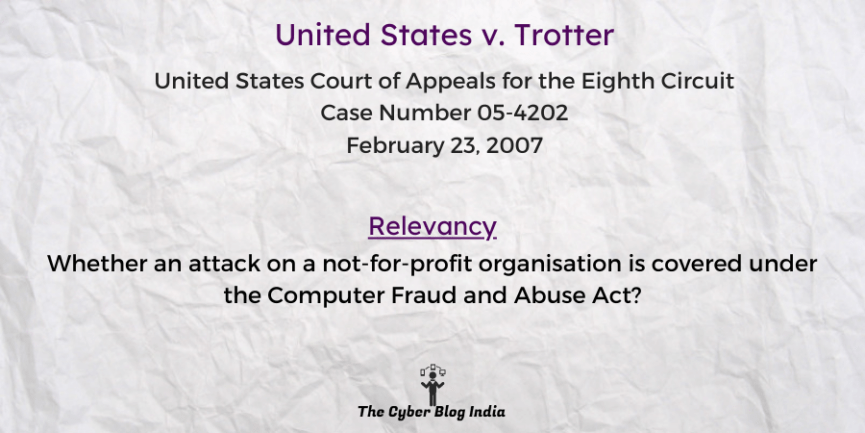United States v. Trotter

United States v. Trotter
478 F.3d 918
In the United States Court of Appeals for the Eighth Circuit
Case Number 05-4202
Before Circuit Judge Riley, Circuit Judge Melloy, and Circuit Judge Shepherd
Decided on February 23, 2007
Relevancy of the Case: Whether an attack on a not-for-profit organisation is covered under the Computer Fraud and Abuse Act?
Statutes and Provisions Involved
- The Computer Fraud and Abuse Act, 18 U.S.C. § 1030
Relevant Facts of the Case
- The defendant was an IT supervisor at the Midland Division of the Salvation Army in St. Louis, Missouri.
- From October 2003, the Salvation Army started experiencing computer network-related difficulties. These included continuous deletion of numerous files from the network, shutting down of a computer-operated phone system, and uploading files with obscenity directed towards the Salvation Army, among others.
- Sometime later, many Salvation Army employees received a message on their computers, reading “Trotter was here”.
- A law enforcement investigation discovered network intrusions originated from an account registered to the defendant’s girlfriend and co-habitant.
- After failing to seek dismissal of his indictment, the defendant pled guilty to one count of computer sabotage under 18 U.S.C. § 1030(a)(5)(A)(i).
- In his plea agreement, he admitted to sending computer commands from his residence and intentionally causing damage to his former employer’s computers.
Prominent Arguments by the Counsels
- The defendant’s counsel argued that his former employer’s computers do not come under the definition of protected computers. Hence, his attack is outside of the scope of CFAA. Further, the counsel contended that § 1030 is unconstitutional as applied to his conduct as the Salvation Army is a not-for-profit organisation.
Opinion of the Bench
- The court disagreed with the defendant’s submission that his former employer’s computers were out of the scope. The defendant’s submissions indicate that the computers were connected to the internet. As a result, this system was inexorably intertwined with interstate commerce.
- § 1030 is constitutional as applied to an attack on the Salvation Army’s computer network. This is consistent with the Seventh Circuit’s decision in United States v. Mitra, 405 F.3d 492 (2005).
Final Decision
- The court affirmed the District Court’s decision.
